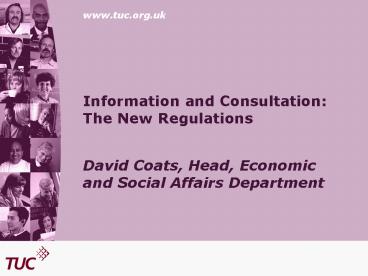Information and Consultation: The New Regulations - PowerPoint PPT Presentation
1 / 13
Title:
Information and Consultation: The New Regulations
Description:
The UK's representation gap. The requirements of the Information and Consultation Directive ... A minimum framework partial harmonisation ... – PowerPoint PPT presentation
Number of Views:31
Avg rating:3.0/5.0
Title: Information and Consultation: The New Regulations
1
Information and Consultation The New Regulations
- David Coats, Head, Economic and Social Affairs
Department
2
Introduction
- The UKs representation gap
- The requirements of the Information and
Consultation Directive - Why does it matter?
- What next?
3
The representation gap in the UK
- Surveys report a lower level of information and
consultation than employers rhetoric suggests - Fewer than a fifth of employees report frequent
consultation on workplace change - 17 asked their views on future work practices
and 14 on plans for the workplace - Only 8 consulted about redundancies and 5 on pay
4
Information and consultation is popular All in
all do you think your workplace would be better
with? ( of employees, BWRPS 2001)
5
The importance of the IC Directive
- A guarantee of worker voice
- A spur to higher performance
- Based on the evidence that a mix of direct and
indirect participation works best
6
Workers favour an organisation whose primary goal
is to work with management to improve the
workplaceover an organisation that defends
workers against unfair treatment by management
(Source BWRPS 2001)
7
The Directives requirements
- A minimum framework partial harmonisation
- Informationtransmission by the employer to the
employees representatives of data - Consultationexchange of views and dialogue
between employees representatives and the
employer
8
What is subject to IC?
- Information on recent and probable development of
the undertakings activities or economic
situation - Information and consultation on employment
matters - Information and consultation with a view to
reaching an agreement on substantial changes in
work organisation and contractual relations
9
Flexibility through agreements
- Provided for in Art 5 of the Directive
- Must be freelynegotiated
- Defining practical arrangements for IC
- Must be consistent with Art 1
- Therefore must be negotiated by representatives
and must provide for IC with representatives - Anything less an inadequate transposition
10
Worker participation counts
- Teamworking/group delegation has a positive
impact on - quality - output -
absenteeism - sickness (EPOC 1997) - Individual delegation/empowerment led to -
faster throughput time - increases in output
(EPOC 1997) - Successful delegation depends upon information
and participation to build trust - Relationships are critical
11
Direct and Indirect Participation
- Optimum results secured by a mix of direct and
indirect participation (EPOC 1997) - Reliance on direct participation only leads to
less employee involvement and poorer productivity
(Wood and Fenton OCreevy, 1999) - Unionised workplaces more likely to make use of
HPWS (WERS 1998, Gallie et al 2002) - US evidence suggests that HPWS unionisation
delivers higher productivity (Black and Lynch
1999)
12
Barriers to high performance/high trust
- Management competence
- Other pressures maximise shareholder value,
meet your targets - Ratner was right!
- Unitarism v pluralism
- Low trust
13
Conclusion
- Evidence of what makes for high performance very
persuasive - UK has serious barriers to high performance
- IC may start to make a difference but only if
employers are imaginative enough to grasp the
opportunity - Govt must set the tone and be enthusiastic
about IC implementation































